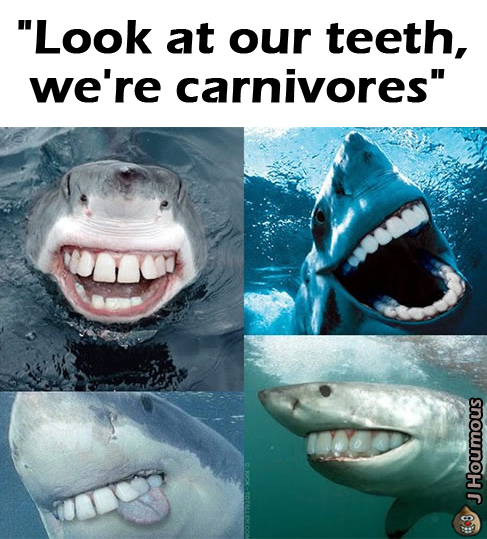this post was submitted on 28 May 2024
325 points (69.8% liked)
memes
10398 readers
3156 users here now
Community rules
1. Be civil
No trolling, bigotry or other insulting / annoying behaviour
2. No politics
This is non-politics community. For political memes please go to [email protected]
3. No recent reposts
Check for reposts when posting a meme, you can only repost after 1 month
4. No bots
No bots without the express approval of the mods or the admins
5. No Spam/Ads
No advertisements or spam. This is an instance rule and the only way to live.
Sister communities
- [email protected] : Star Trek memes, chat and shitposts
- [email protected] : Lemmy Shitposts, anything and everything goes.
- [email protected] : Linux themed memes
- [email protected] : for those who love comic stories.
founded 1 year ago
MODERATORS
you are viewing a single comment's thread
view the rest of the comments
view the rest of the comments

Human teeth also have sharp peaks and deeper valleys within them which is the case for the overwhelming majority of omnivorous creatures. Most obligate herbivores have flatter teeth or will regrow them unless they have teeth explicitly for a particular use case.
Source: You can check out scads of scientific resources on herbivores versus omnivore versus carnivore teeth. I assume you know how a search engine works, but here's a solid article on differences.
Also my sister has been one of the veterinary bigwigs at several zoos through her lifetime and we've had multiple discussions on it.
How is a blog a source? All you've given is anecdotal evidence. I have that too. Pandas, sharp teeth, claws, obligate herbivores. Gorillas, sharp teeth, big muscles, obligate herbivores.
I'm sure your sister is a fine veterinarian, and if we're going to get anecdotal I have a degree in biology and don't really care what opinion your sister has. I work for real medical doctors who are anti-vax. Someone's job doesn't make them sensible.
Errrr... are you looking for me to provide you a primary scientific source for how teeth work in animals with differing diets? Most of that is in veterinary texts (which is an amalgam of info), but it's akin to asking for a scientific evidence for gravity. What you're asking is too broad to be covered in a single paper and shows a misunderstanding of how scientific studies focus and function. I was simply giving you a primer since you asked, and that blog is good enough for that (and accurate from the portion I read).
I can point you at papers (such as this one on Tooth root morphology as an indicator for dietary specialization in carnivores) which can help explain part of how food selection works in evolution, but I'm not sure what level of information would satisfy you or why you'd even want it?
Here's one on how tooth wear affects teeth differently based on evolutionary eating habits.
Here's one on the development and evolution of teeth.
Here's one on mammalian teeth in specific.
If you'd like more, feel free to use https://scholar.google.com/ to look for more.
I don't have anything to add, but I want to take a moment to applaud your comment. Well done, truly.
I appreciate it! I mod [email protected] if you'd ever care to join us.
We try to disagree in good faith and not attack each other there.